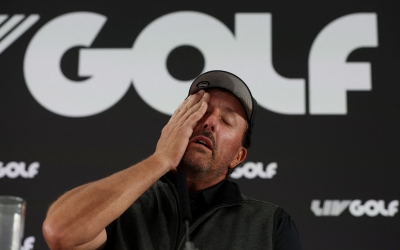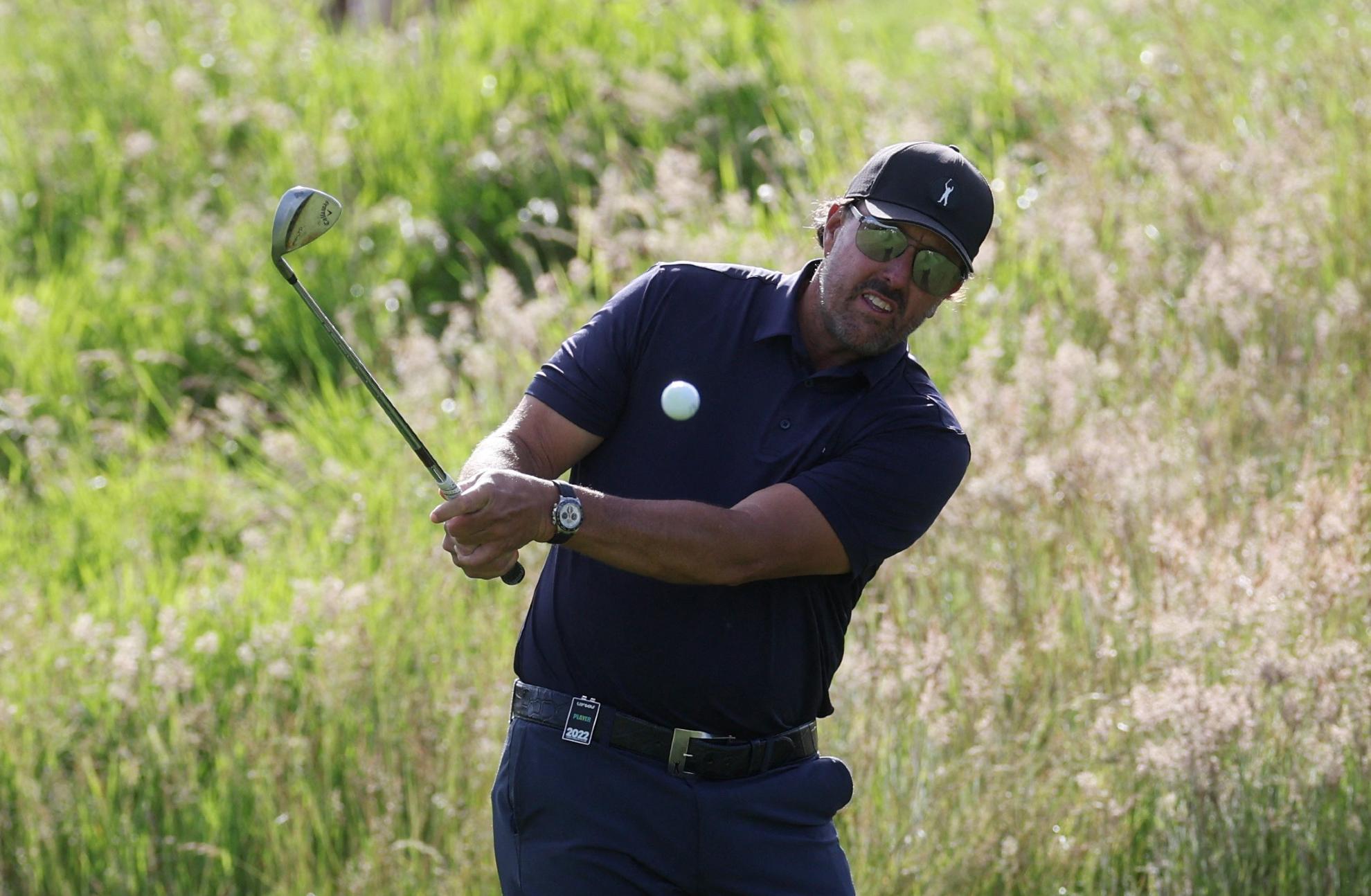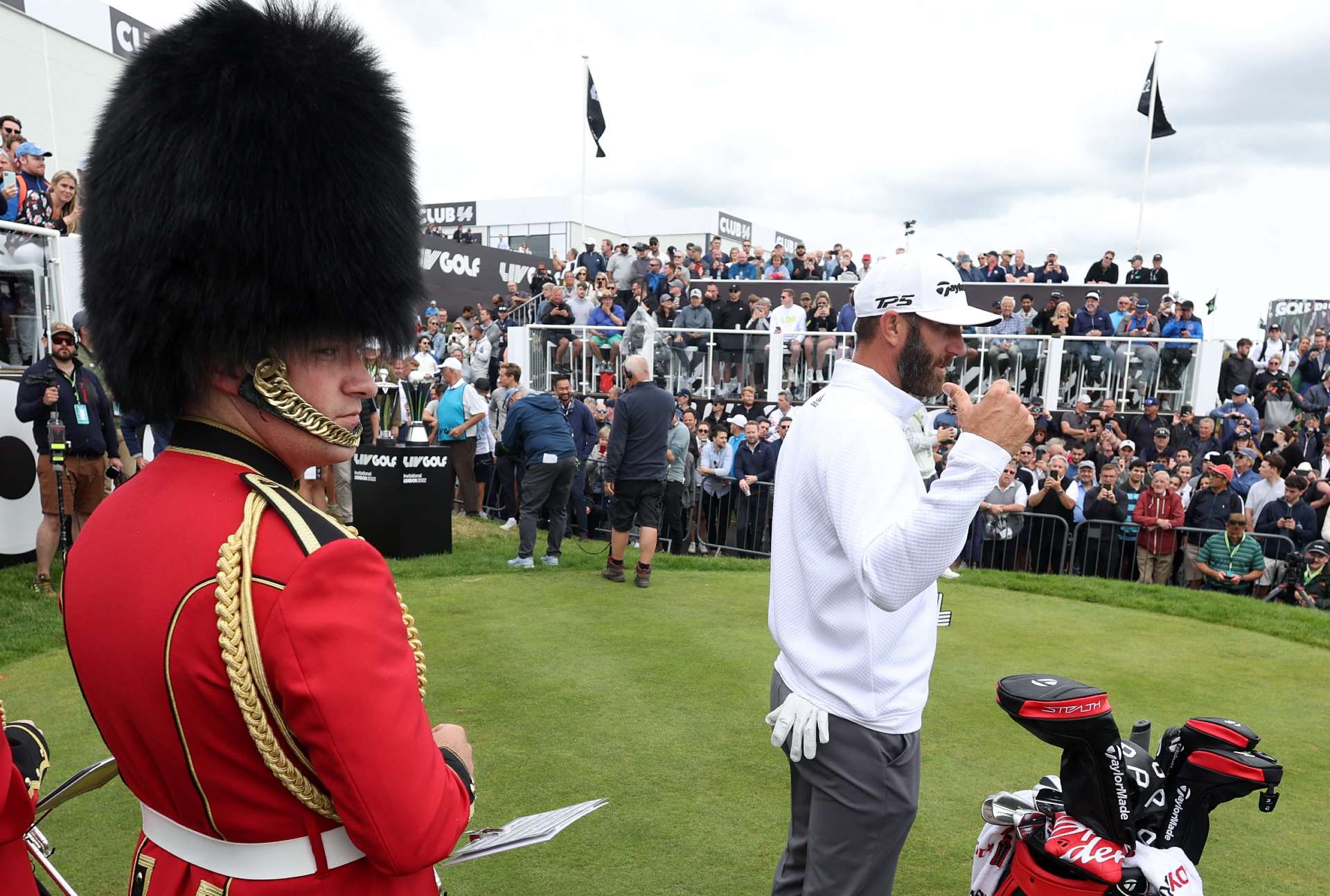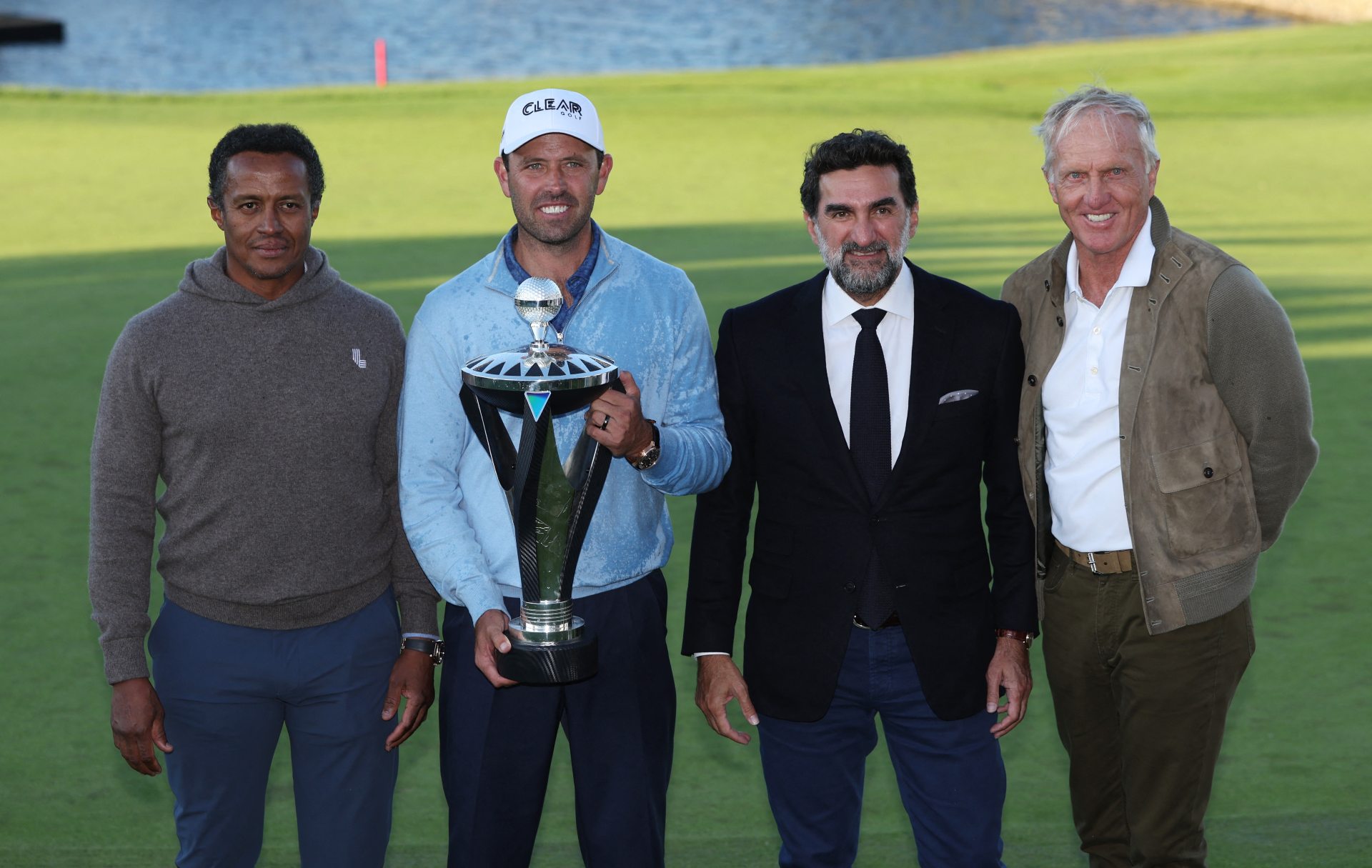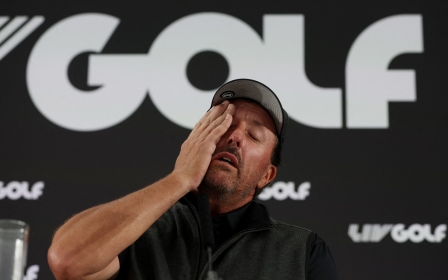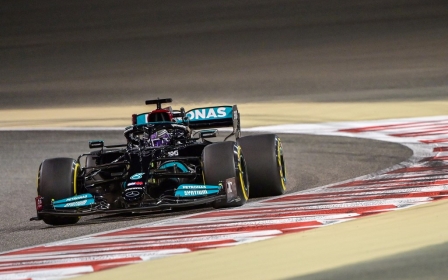PGA Tour vs LIV: How Saudi Arabian money ignited a golf war
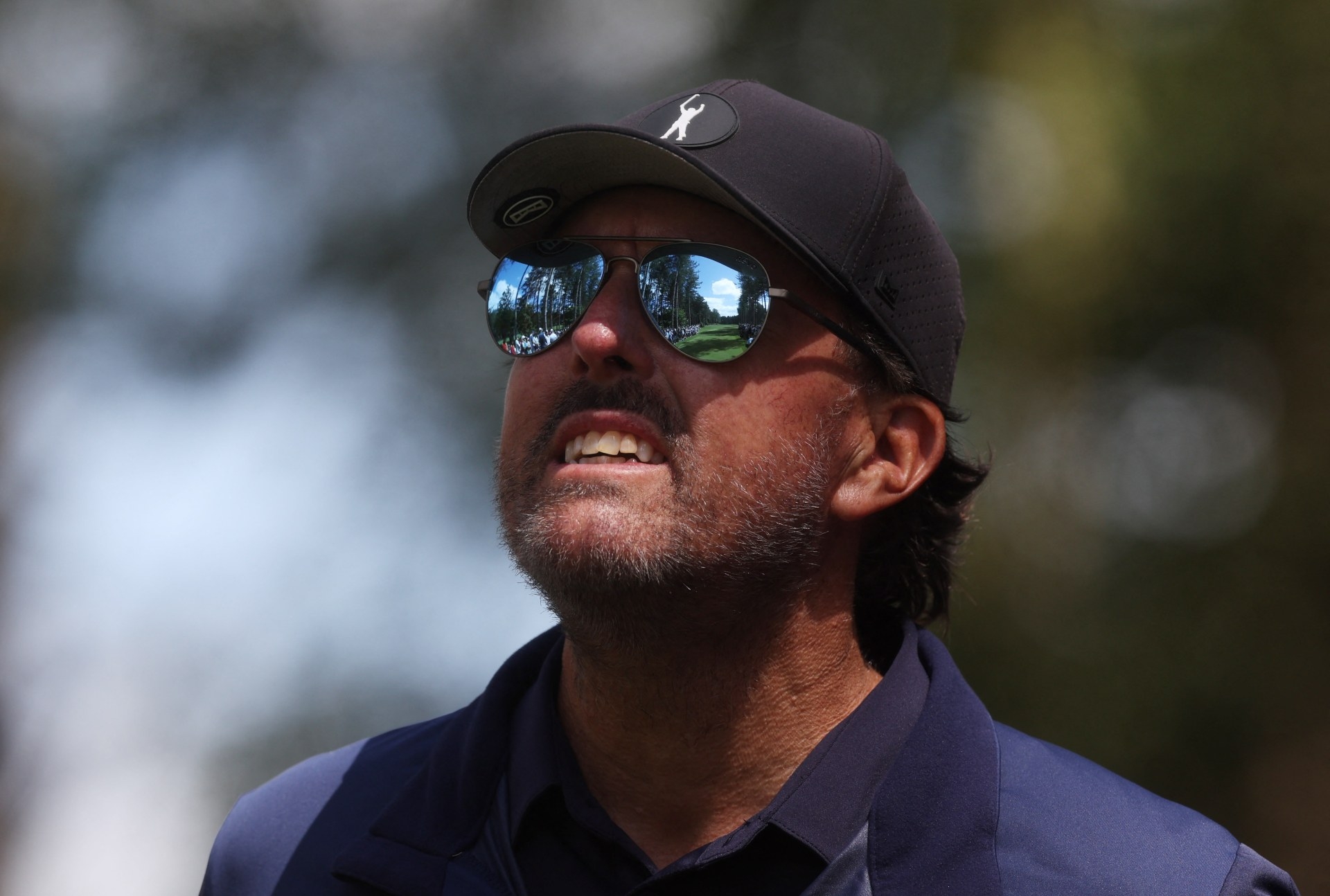
It’s Friday night and Craig David is walking on stage at a golf club in Hertfordshire, southern England, as part of a breakaway tournament sponsored by the kingdom of Saudi Arabia.
He is wearing a white denim jacket, a white T-shirt and white pre-distressed jeans. In the field in front of him are about a thousand people, a sound box, some food trucks and a bar. The scene resembles a small music festival, rather than a golf event.
Craig David is 41-years-old and his biggest hits are now more than two decades old.
“Hemel Hempstead, how you feeling tonight?” he asks after playing one of his hits, the pop-garage UK number one Fill Me In. “I hope you had a great day of golf, if you were playing.”
A few days earlier, David was performing outside Buckingham Palace as part of the Queen’s Jubilee celebrations.
New MEE newsletter: Jerusalem Dispatch
Sign up to get the latest insights and analysis on Israel-Palestine, alongside Turkey Unpacked and other MEE newsletters
Now he is on the sidelines of a Saudi-bankrolled project that has ignited a golf war, introducing previously unheard of sums of money into the game and forcing some of its top stars to answer questions about sportswashing and human rights abuses.
'Neckless security dudes'
It’s Wednesday morning and Phil Mickelson is facing the press at Centurion Golf Club. The 51-year old, a winner of six major championships, hasn’t played for four months. Now here he is on the edge of London, about to compete in the first event of the LIV Golf Invitational Series for a reported $200m.
The American wears a cap, sleeveless fleece vest and a golf shirt. He is unshaven and carrying what looks like a little extra weight, but he maintains some of the wayward frat boy charm that helped him become his generation’s second-most recognised talent after Tiger Woods (Woods turned down a “mind-blowingly enormous” offer upwards of $1bn to be here with his old rival, according to Greg Norman, the former Australian golfing legend turned LIV Golf CEO).
The press conference is full, and the assembled journalists aren’t about to let “Lefty” (Mickelson is left-handed) get away with the ritual humiliation that is coming his way.
In February, it emerged that Mickelson had told his unofficial biographer Alan Shipnuck that the Saudis were "scary motherfuckers" with a “horrible record on human rights".
He said the Saudi golf league was nothing more than “sportswashing”, but that the kingdom’s money gave him and golfers willing to participate “leverage” against the PGA Tour, which has represented the pinnacle of the game for close to a century.
The owner of an English Premier League football club and host of Formula One races, WWE showdowns, boxing bouts and e-sports events, Saudi Arabia, under the leadership of Crown Prince Mohammed bin Salman has looked to build soft power through sport. Golf is the latest prize up for grabs.
Shipnuck was present at the Centurion Golf Club, and at the end of play on Thursday he was removed from Mickelson’s press conference by officials he referred to as, “neckless security dudes… acting on orders from their boss, whom they refused to name (Greg Norman? MBS? Al Capone?).”
A photo then emerged of Shipnuck being thrown out with Norman standing behind the journalist, a grimace on his face.
On 12 March, three weeks after Mickelson’s “scary motherfuckers” comments emerged, and many months into his negotiations with LIV Golf, Saudi Arabia executed 81 people in a single day. After the series began, a 9/11 survivors group condemned the American golfers participating in it.
“Certainly I’ve said and done a lot of things I regret and I’m sorry for that,” Mickelson said, when asked at the press conference about his dramatic change of heart.
Was he sorry for “speaking the truth about the Saudis or sorry about your shameless hypocrisy in taking their money?"
“I understand many people have very strong opinions and may disagree with my decision,” Mickelson replied.
At times, the interrogation resembled, in the words of veteran reporter Martin Lipton, “a hostage video”.
"I don't condone human rights violations at all," the American golfer said, again and again.
"I'm certainly aware of what happened with Jamal Khashoggi, and I think it's terrible," he added, referring to the MEE and Washington Post columnist murdered by Saudi agents in October 2018.
But it was a hostage video peppered with solemn talk from Mickelson of “learning from my mistakes”, conducting “hundreds of hours of therapy” and having an “awesome time” travelling with his wife Amy and skiing in Aspen.
Beneath his podium, a motorised drinks cart bearing cans of Pepsi, R Whites lemonade and bottles of Ballygowan mineral water shuttled about the place.
Following on from Mickelson, veteran English stars Lee Westwood and Ian Poulter framed their decision to play LIV Golf, which is backed by Saudi Arabia’s Public Investment Fund (PIF), as being about family and wellbeing.
“I’m just trying to provide for my family,” said Poulter, whose career earnings have reportedly reached close to $50m.
“We are independent contractors,” said Westwood (career earnings $55m).
LIV Golf Ltd lists its address as care/of Zedra, a financial services company that, in its own words, provides “agile solutions to wealthy families, entrepreneurs, companies, and funds, which generate efficiencies in a scalable and sustainable way”.
'I believe it’s wrong that Saudi Arabia should use its oil wealth to promote a competition that will get players to fly around the world, using up even more fossil fuel'
- Stephen Marcus, protester
Zedra has offices in tax havens like the Cayman Islands, Guernsey, Jersey, Luxembourg and Liechtenstein, as well as an office in St Albans, just minutes from the Centurion Golf Club. The Saudi PIF, whose chairman is Crown Prince Mohammed bin Salman, is also the majority owner of English Premier League football club Newcastle United.
The $255m LIV Golf series will feature six more events in 2022, including one in Saudi Arabia and two at US golf clubs owned by Donald Trump.
The total prize money on offer in the UK was $25m, with a $20m pot for the individual event and $5m more to split in the team competition. No one has every played golf for more money on British soil.
The winner, South African Charl Schwartzel, took home $4m. The last place finisher at each event is guaranteed $120,000.
Asked if there was anywhere Westwood and Poulter wouldn’t play - Vladimir Putin’s Russia or apartheid-era South Africa, for example - the two golfers, who had been putting on a jocular double act, turned icy.
“I’m not going to comment on speculation,” Poulter said. “I don’t need to answer that question,” said Westwood. Moderating the press conference, Ari Fleischer, once George W Bush’s White House press secretary, drew things to a close.
'It's just capitalism'
It’s Thursday afternoon and everything is ready for the start of play. The event, like any festival or sporting occasion, is a beast with many tentacles.
Large fields around the golf club have been repurposed as car parks, with parking attendants paid £11 an hour directing traffic. In the kitchens, catering company Constellation was paying its workers £10 per hour.
Malachi Parker, an 18-year-old working in the kitchens, said he didn’t realise Saudi Arabia was sponsoring the event.
Just inside the entrance, Hertfordshire police can be seen in full uniform accessorised with LIV Golf lanyards.
Two ranks of London taxis, driven by real-life London taxi drivers, occupy a patch of ground near the 54 Club, named after the number of holes being played at the tournament, a whole round shorter than the traditional 72.
The cabbies have been employed by LIV Golf for the week, assigned to bring the players and other assorted dignitaries - along with the odd ordinary punter - to and from their hotels.
The players are staying at the five-star Grove Hotel in nearby Watford; most of the staff are staying in central London. On the side of every cab is an advert for the event. Next week it’ll be for something else.
The taxi drivers all knew about Jamal Khashoggi’s murder and they all thought it was awful. Karl, a driver in his 50s, said that like the golfers, he had a family to feed - it’s just that he wasn’t getting paid millions of dollars for the privilege.
The conversation turned to whether there was any clean money to be found in sport anywhere, Saudi or otherwise. “It’s just capitalism, isn’t it?” said Karl.
About an hour before the tournament starts, a brass band that looks to be that of the storied Grenadier Guards marches and plays for the crowd.
In their red military jackets, tall bearskin hats and dark trousers they appear, from a distance, to be the real deal. In fact, two of the members told MEE, the band is called the London Fanfare Trumpets, and the military uniforms were just a costume.
Taking in the scene underneath a marquee in the “Fan Zone”, Brennan Gough, 24, told MEE it was “more like a festival. It’s amazing here. Everyone’s got a smile on their face."
Gough said the shorter format, food, drink and entertainment would make it easier for him to get friends his age into golf, with its reputation as a sleepy game for retired men.
“It’s a tricky question, the Saudi thing,” he said. “I don’t know. As a golf fan, I just watch people hit balls. I don’t think people here know what happens in Saudi Arabia, or what they do.”
'As a golf fan, I just watch people hit balls. I don’t think people here know what happens in Saudi Arabia, or what they do'
- Brennan Gough, 24
He said the tournament reminded him of English cricket’s all-action Hundred competition - and it was a comparison he could make with some authority as the son of a former England cricketer, Darren Gough, who also happens to be a member of Centurion Golf Club.
Mark Lee-Sang, 23, also told MEE that LIV Golf had “more of a festival vibe”.
“The money’s always controversial,” he said. “The idea comes from getting people into golf - it’s such a niche sport. In my mates’ WhatsApp group no one is really bothered by Saudi Arabia. If you can create an exciting environment, then that’s better for the game.”
Outside Centurion Club, local Extinction Rebellion (XR) protesters stood with signs protesting “Saudi blood money”.
"I believe it’s wrong that Saudi Arabia should use its oil wealth to promote a competition that will get players to fly around the world, using up even more fossil fuel,” Stephen Marcus, one of the protesters, told MEE.
“In addition, Saudi Arabia has a horrendous human rights record and it should not be able to sportswash its reputation without being challenged. Our civilisation will only survive if we have climate and social justice."
Saudi Aramco is the world’s largest corporate greenhouse gas emitter.
Crazy golf
Mickelson teed off with another of the fledgling tournament’s big draws, former world number one Dustin Johnson, wearing a white top and a white cap.
Earlier, in the media centre, MEE heard two veteran US golf reporters describe what Johnson and Mickelson were doing as “the craziest thing they’ve ever done”.
“It’s like Succession,” one of them said, referring to the HBO television series about a dysfunctional media dynasty and the vast sums of money being thrown around.
The day before, Mickelson had played a round of pro-am golf with Yasir al-Rumayyan, chairman of Newcastle United and governor of the PIF.
When pressed for a response on accusations that the LIV Golf is another example of sportswashing by the Saudi government, al-Rumayyan said: “We're not sure about this terminology,” and walked away.
Before the two American stars hit their first shot, nine planes flew past, arching and looping, moving in and out of formation.
After a few hours spent out on the course, a pattern began to emerge. None of the spectators MEE was speaking to had paid to be there.
Vanessa and Andrew Bond, a married couple who live about 20 minutes from the club, had come along after a targeted advert popped up on Andrew’s Facebook feed.
The advert included a code that could be used to claim free tickets for locals, but as Andrew said, “there was no way of checking if you were local”. Dozens of other attendees spoken to by MEE had arrived in exactly the same way.
“How can you get that much money?” Vanessa asked of Saudi Arabia’s sponsorship, “to them a million pounds is like a grand.”
“It should make a difference, shouldn’t it?” Andrew said, when asked about where the money for the tournament came from. “It makes me sad about the PGA and the European tour. Do you think we should all go home?”
The married couple joked about how Mickelson and Johnson’s respective personal histories would go down in conservative Saudi Arabia. “Dustin had a cocaine habit, Phil had his gambling - it’s perfect for the Saudis, isn’t it? They’ve not done their research.”
Johnson has reportedly been suspended by the PGA Tour multiple times for cocaine use, while Mickelson had told Wednesday’s press conference that his gambling problems - which became “reckless and embarrassing” and reportedly led to him losing $40m between 2010 and 2014 - were “almost a decade ago”.
Standing near the Bonds by the green on the second hole, Peter, who works as a marshal at the historic Wentworth Golf Club, was the one spectator MEE spoke to who expressed not confusion or apathy or concern about Saudi sponsorship, but support for it.
He was angry about the questions journalists had been asking about the kingdom. “I’ve got no problem with it at all. It’s not sports people’s job to do politics,” he said. “I was pissed off with the way they were attacked." The media was looking to provoke a reaction, he said.
Peter’s remarks echoed those of golfing legend Gary Player, a South African who once enthusiastically supported his country’s apartheid regime. Speaking to Sky Sports, Player talked about “our allies”, the Saudis, who he had heard too many “detrimental things” about. He moved on to talk about how “freedom is on the wane around the world today”.
Other spectators scattered across the course had been given free tickets through work connections or had used codes tweeted out by some of the golfers playing, including Lee Westwood and Ian Poulter. Even more were members of the club, or knew people who were members of the club. Of the almost 250 spectators MEE spoke to, not a single one had paid to be there.
“It would be a laughing stock if no one was here,” Andrew Bond said, arguing that LIV Golf needed spectators to turn up partly in order to make its broadcast look authentic.
There was a historical precedent here. In 1977, when Kerry Packer’s World Series Cricket began, looking to do to that game what LIV Golf hopes to do to golf, the first match in Adelaide was played in front of only 500 people. Broadcast journalists filming the game could not disguise the vast stretches of empty stadium.
With Sky Sports announcing its big new deal with the PGA Tour just days before LIV Golf began, and ESPN, CBS, NBC and Amazon in the first year of a nine-year agreement that has them collectively paying hundreds of millions of dollars a year to the PGA Tour to show tournaments, LIV Golf has been left without an official broadcaster.
Instead, the Saudi series is broadcasting itself, with live feeds on its website, YouTube and Facebook pages.
Average YouTube viewing figures for the first round were 94,000, while for the second round they were 54,000. Coverage, headed up by American football commentator Arlo White, went heavy on hyperbole, promising “relentless action” and “a game of high fives, fist pumps and flying tees”.
As soon as the relentless action had begun, Jay Monahan, the PGA commissioner, banned 17 members of the tour for playing in the “Saudi golf league”.
LIV Golf hit back, calling the decision “vindictive” and promising “the era of free agency is beginning”.
Golf journalists who had thought the Saudi-backed series would never get off the ground told MEE that there was now a real chance it would compete seriously with its main rivals, the PGA and DP World tours.
On Friday night, against a moonlit backdrop, Craig David brought his set to a close with a run of hits.
“We are all stumbling through the night,” he sang, “but it’s paradise in our minds.”
Projected behind him, we could see images of yachts sailing on sparkling seas.
Middle East Eye delivers independent and unrivalled coverage and analysis of the Middle East, North Africa and beyond. To learn more about republishing this content and the associated fees, please fill out this form. More about MEE can be found here.


